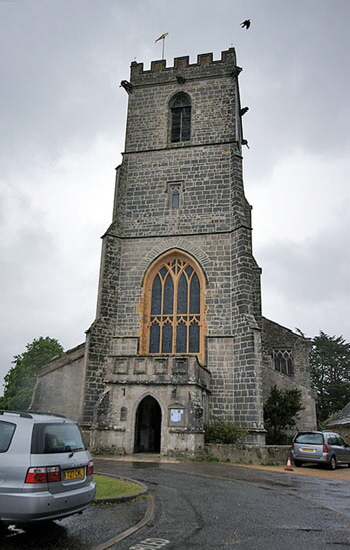|
Alphabetical List |
|
|
|
|
|
|
|
County List and Topics |
|
|
|
Please sign my Guestbook and leave feedback |
|
Dedication : St Mary Simon Jenkins: Excluded Principal Features : Lead Font; Norman St Edward’s Chapel |
|
|
|
|
If the lead font is arguably a curiosity, St Edward’s Chapel is a treasure. Unbelievably, it seems that the Victorians had no idea how old the nave was when they destroyed it. Perhaps even the Victorians could recognise a Norman chapel when they saw one so that is why it survived. It sits inconspicuously in the south east corner of the church under a very low vaulted ceiling that itself dates some two centuries later than the chapel. It is crypt-like in its atmosphere and proportions. It was dedicated to King Edward who reigned between AD875-8 before being murdered in Corfe Castle, probably by supporters of his half-brother Aethelred the Unready. Edward was hurriedly buried at Wareham but was moved to Shaftesbury a couple of years later. With wearisome predictability, miracles were attributed to him and he was duly recognised as a saint. You might feel that I have done a poor job of “selling” this church to you but the font and chapel are well worth seeing. More to the point, the two Wareham churches are halves of one fascinating story of a town that few of us are familiar with today but which was pivotal during Wessex’s struggles to contain the Danes. What is more, you can see see remains of Alfred’s fortifications. |
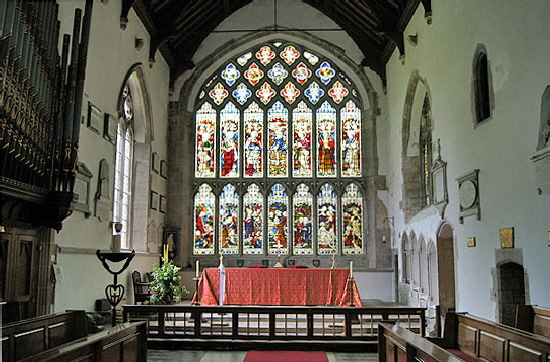 |
||||||
 |
||||||
|
Left: The chancel.Most of what you can see is fourteenth century. That includes the impressive east window of about 1325 but not, of course, the glass. The low door to the right don a few stairs to St Edward’s Chapel. Right: Looking towards the west end. The tower arch and the tower itself are fifteenth century. Everything else is bland, inoffensive Victorian. |
||||||
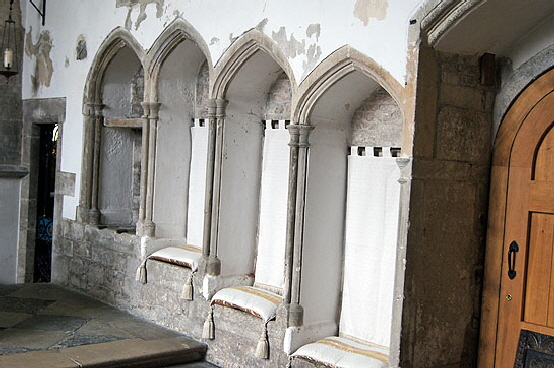 |
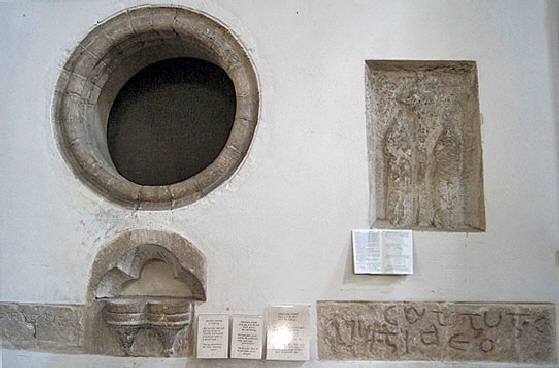 |
|||||
|
Left: The triple sedilia and double piscina - the standard furnishings of a late medieval parish church. To the left is a doorway to the tiny fourteenth Becket Chapel which is kept locked. Right: A rather eclectic composition in the north aisle. Most conspicuous is a round Norman window which was reconstructed from the original stone that was found in the wall of the chancel when it was rebuilt. To its right is a badly weathered fourteenth century sculpture of the crucifixion originally over a north doorway to the church. A simple mediaeval double piscina also survives. Below the plaques is a a strange inscription. It is Anglo-Saxon and refers to “Catgug” which in modern Welsh would have been Cadogan. It means glorious in battle. The “Fi” of “filius” is missing and followed by “deo”: “faithful to God”. |
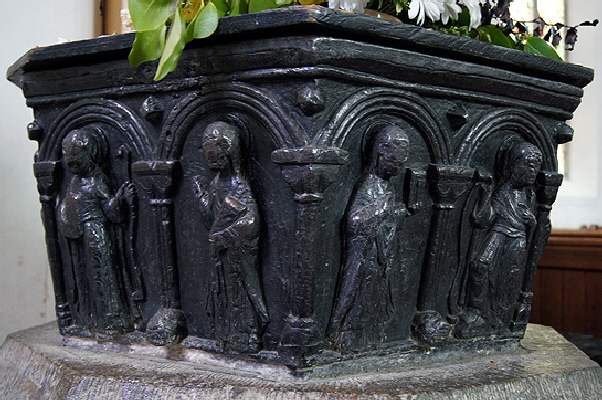 |
|||||||||||||||||||||||||||||||||
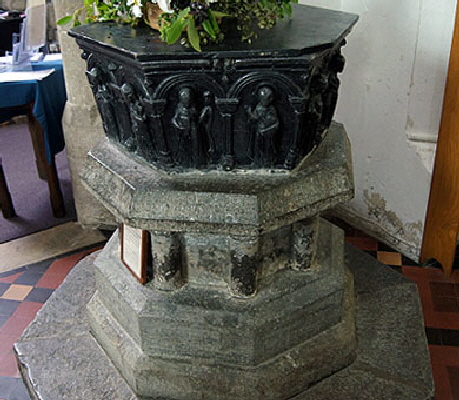 |
|||||||||||||||||||||||||||||||||
|
Left: The lead font sits on a later Purbeck marble base. Right: Two of the faces. The apostles sit below Norman round arches that would have been the architecture of the time. The decoration has surprising depth, and the font could easily be mistaken for one of the even scarcer and infinitely more expensive Tournai marble ones., |
|||||||||||||||||||||||||||||||||
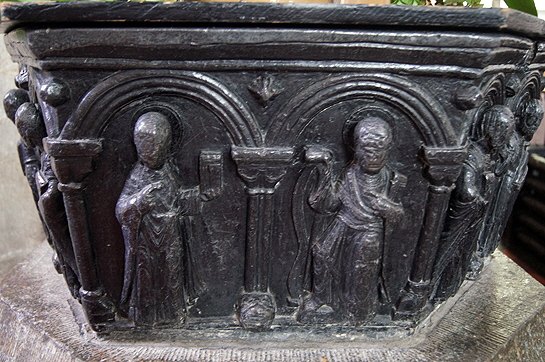 |
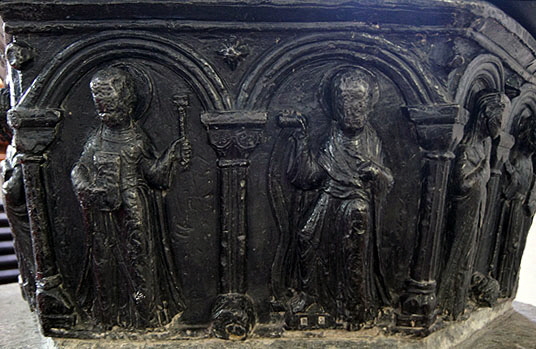 |
||||||||||||||||||||||||||||||||
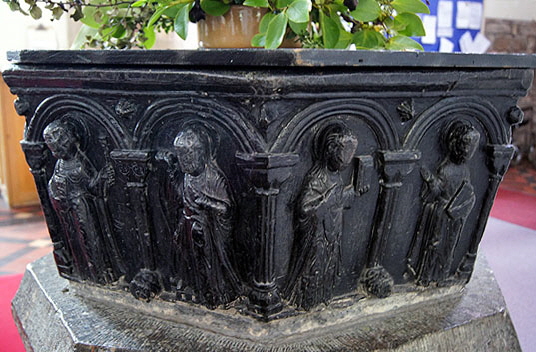 |
|||||||||||||||||||||||||||||||||
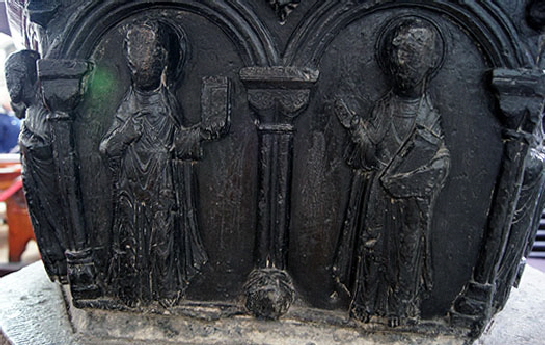 |
|||||||||||||||||||||||||||||||||
|
Various aspects of the font |
|||||||||||||||||||||||||||||||||
 |
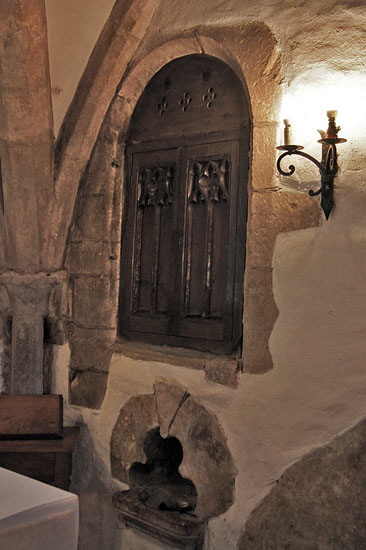 |
||||||||||||||||||||||||||||||||
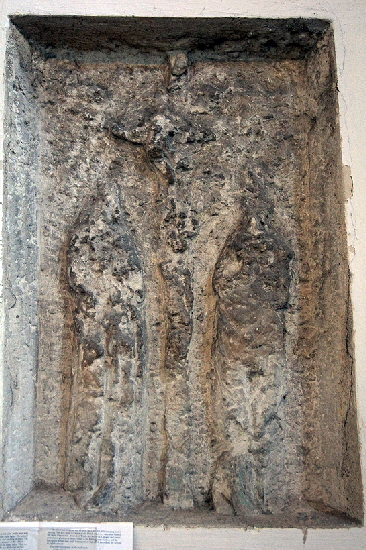 |
|||||||||||||||||||||||||||||||||
|
Left: St Edward’s Chapel. The east window is thirteenth century, as is the vaulted roof. Centre: Aumbry cupboard and piscina to the right of the altar in St Edward’s Chapel. Right: The fourteenth century crucifixion sculpture. |
|||||||||||||||||||||||||||||||||
 |
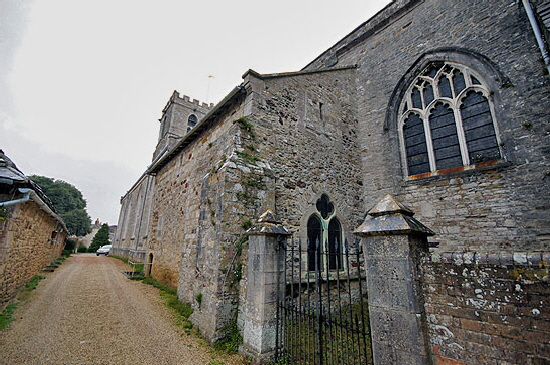 |
||||||||||||||||||||||||||||||||
|
Left: Another (and very wide angle) view of St Edward’s Chapel. Right: The chapel (behind the gates) from the outside. The heavy fall in the ground from west to east accentuates its crypt-like subterranean feel. |
|||||||||||||||||||||||||||||||||
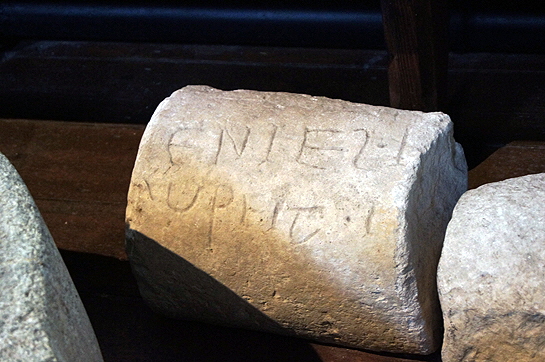 |
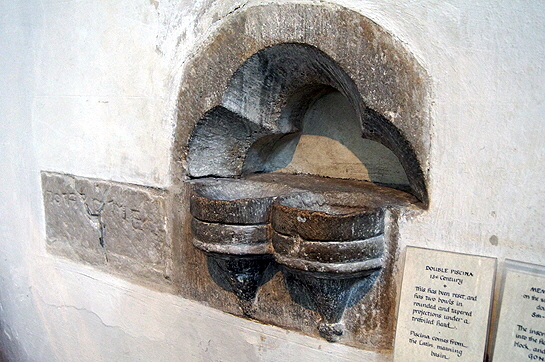 |
||||||||||||||||||||||||||||||||
|
Left: Another ancient stone that was, like several others here, recovered from the walls of the nave. This one also refers to a man called “Deniel”, another Welsh name. Odd? See the footnote below. Right: The thirteenth century double piscina in the north wall. |
|||||||||||||||||||||||||||||||||
 |
|||||||||||||||||||||||||||||||||
|
The Catgug Inscription. The nature of the inscriptions is interesting. Clearly, they are not by skilled sculptors! It seems like they were hacked out by the surviving friends and families in moving testimonies. |
|||||||||||||||||||||||||||||||||
|
Footnote 1 - The “Welsh” |
|||||||||||||||||||||||||||||||||
|
To understand what the Welsh were doing in Dorset to have to understand who were the Welsh! Well, it is not for nothing that we still lazily refer to Wales, Scotland and Ireland as “The Celtic” nations. But the word derives from the Anglo-Saxon word “Wealsc” which simply means” foreigners”. We Britons were all Celtic and we spoke a form of the Celtic language called “Brythonic”. To the Saxons we were all “Wealsc”. What happened when the Anglo-Saxons (as well as the Jutes and Frisians) arrived in post-Roman Britannia is still a source of much dispute. Was there genocide? That notion seems largely discredited. But it is a fact that many Britons were displaced and many headed west to join the existing populations of what we now call Wales. The kingdoms there, such as Powys and Gwynedd remained more or less independent and retained their own kings. Indeed, so did Cornwall. The Anglo-Saxons also never subjugated what we now know as Scotland. The southern areas were sometimes under Northumbrian rule but in fact, just to confuse things, a large part of south west Scotland had kings of Irish descent! We need then to completely forget notions of England, Scotland and Wales. They did not exist as political entities in the first millennium. England or “Anglaland” was not a reality until the tenth century. So, these seventh century stones in Wareham do not commemorate men from what we now call Wales. They commemorate Britons who lingered in Wessex where they and their forefathers had always lived. They did so before the Brythonic language in what we now call England was completely transformed into what we now call “Old English” and which, by the way, no untrained modern person would be able to speak, read or write. These stones, then, are a wonderful reminder to us of a time when all was change and when Celt and Saxon were still learning to live with each other. |
|||||||||||||||||||||||||||||||||
|
Footnote 2 - Aethelred the Unready and Musings on Nicknames! |
|||||||||||||||||||||||||||||||||
|
As we have seen, “Saint” Edward was probably murdered by supporters of his half-brother, Aethelred “The Unready”. By the way (my favourite clause), early kingships in England (and indeed elsewhere in Britain) were not necessarily hereditary. They needed the approbation of the thegns and ealdorman who might, as in this case, prefer another candidate. Anyway....Aethelred. The modern world seems to have lost its facility with nicknames. George III was known as "Mad King George" only posthumously and "Farmer George" which was contemporary, is lost. What about Edward (VII) "The Unzipped"? Victoria "The Sombre"? Elizabeth "The Virtuous"? Charles (I) "The Headless" would have been good. Henry VIII "The Incontinent" even better. Or "The Axeman". Where is the imagination? |
|||||||||||||||||||||||||||||||||
